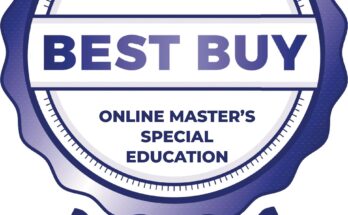Are you passionate about making a difference in the lives of young people? Do you dream of becoming a teacher but feel unsure about the next steps? An online education master’s could be the key to unlocking your potential and embarking on a rewarding career in education. This comprehensive guide will explore the benefits of pursuing an online Master’s in Education, demystify the different degree options available, and provide actionable insights to help you navigate your journey to becoming a teacher. Whether you’re an aspiring educator or a seasoned professional seeking to enhance your skills, this article will equip you with the knowledge and resources to succeed in the dynamic field of education.
The Advantages of Flexible and Affordable Online Learning
One of the primary advantages of an online Master’s in Education is the flexibility it offers. With asynchronous learning and the ability to study on your own schedule, you can seamlessly integrate your academic pursuits with your work and personal commitments. Whether you’re juggling a full-time job, caring for a family, or balancing multiple responsibilities, online programs provide the convenience and accessibility to help you achieve your educational goals without disrupting your daily life.

Moreover, online Master’s in Education programs often come with a more affordable price tag compared to traditional on-campus programs. By eliminating the costs associated with commuting, on-campus housing, and other campus-related expenses, online students can enjoy a more cost-effective path to furthering their education. Many institutions also offer financial aid, scholarships, and payment plans to make the pursuit of an advanced degree even more attainable.
In addition to cost savings, the variety of available online programs allows you to select a path that aligns with your career goals and interests. With a diverse array of specialized degrees tailored to different aspects of education, you can find a program that truly resonates with your aspirations and equips you with the knowledge and skills to make a lasting impact in the classroom.
Exploring the Distinct Online Education Masters Degree Options
When it comes to online Master’s in Education programs, there are two primary degree paths to consider: the Master of Education (M.Ed.) and the Master of Arts in Teaching (MAT).
Master of Education (M-Ed-): Developing Systemic Expertise
The Master of Education degree offers a broad and comprehensive approach to educational studies. This program is designed to prepare students for a wide range of roles within the education field, including administrative positions, curriculum development, and educational policy. The M.Ed. curriculum often covers topics such as educational psychology, instructional design, and educational leadership, equipping graduates with the knowledge and skills to make a significant impact at the system-wide level.

As an M.Ed. graduate, you can expect to engage with educational research and contribute to developing innovative teaching practices that benefit both students and educators. Potential career paths include roles such as educational administrators, curriculum specialists, or instructional coordinators — positions that require a deep understanding of educational systems and the ability to implement effective strategies across diverse learning environments.
Master of Arts in Teaching (MAT): Empowering Classroom Leadership
In contrast, the Master of Arts in Teaching (MAT) program focuses more directly on classroom teaching and management. This degree is ideal for individuals who hold a bachelor’s degree in a subject area and want to obtain the necessary teaching credentials and pedagogical expertise to enter the teaching profession. The MAT curriculum typically includes coursework in instructional methods, classroom management, and student assessment, preparing graduates to step into the classroom with confidence and effectiveness.

An MAT degree is particularly valuable for those seeking to make an immediate impact in K-12 education. Graduates are equipped with the skills to create engaging lesson plans, foster positive learning environments, and assess student performance effectively. Many MAT programs also include a student-teaching component, allowing candidates to gain hands-on experience in real classroom settings, which is invaluable for their professional development.
Navigating the Path to Becoming a Teacher
Choosing the right online Master’s in Education program is a crucial step in your journey to becoming a teacher. When selecting a program, consider factors such as accreditation, program reputation, faculty expertise, and the specific concentrations or specializations offered. Engage with admissions counselors and current students to gain a deeper understanding of the program’s strengths and how it aligns with your professional goals.
In terms of admission requirements, most online Master’s in Education programs will expect applicants to hold a bachelor’s degree from an accredited institution, demonstrate English proficiency, and potentially submit standardized test scores or a portfolio of relevant work. Additionally, research the specific licensure requirements for the state in which you plan to teach, as some programs may be designed to help students meet these state-specific guidelines.
Many programs also offer resources to assist students in finding internships or student-teaching placements, which are essential for gaining practical experience. These connections can significantly enhance your resume and provide networking opportunities that are crucial for securing a position in the competitive education job market.
FAQ (Frequently Asked Questions)
Do I need a master’s degree to become a teacher?
While a master’s degree is not strictly required in most states, it is highly recommended. Earning an advanced degree in education enhances your credentials, increases your earning potential, and provides you with specialized knowledge and skills that can make you a more effective and competitive teacher.
What can I do with a Master’s in Education?
A Master’s in Education opens the door to a variety of rewarding career paths. Graduates may pursue roles as classroom teachers, curriculum developers, educational administrators, school counselors, or educational researchers, among other options. The specific career opportunities depend on the program’s focus and your area of specialization.
How long does it take to complete an online Master’s in Education program?
The duration of an online Master’s in Education program can vary, but most can be completed within 1-2 years. The exact timeline may depend on factors such as the program’s credit requirements, course load, and whether you choose to study full-time or part-time.
Unlock Your Potential: The Time is Now
In the ever-evolving landscape of education, the demand for knowledgeable and adaptable teachers has never been greater. An online Master’s in Education can be the transformative step that empowers you to unlock your full potential and make a lasting impact on the lives of your students.
Whether you’re an aspiring educator or a seasoned professional seeking to enhance your skills, the flexibility and affordability of online programs make the pursuit of an advanced degree more accessible than ever. By exploring the diverse range of Master’s in Education options, you can find the program that aligns with your career goals and equips you with the specialized knowledge and practical expertise to become an exceptional teacher.
The time is now to embark on your journey towards making a meaningful difference in the educational landscape. Start exploring the world of online Master’s in Education programs and take the first step towards achieving your aspirations of becoming a teacher who inspires and leads the next generation.



